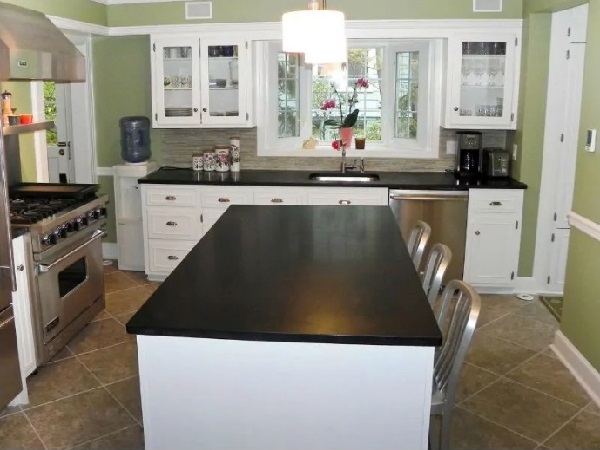Choosing the right kitchen countertop material will make a huge difference over the years you’ll own a home. Just like anything else with a house, the stuff you take the time to research and choose wisely will pay dividends, and the things you overlook will consistently bug you.
Most homebuyers take months to find a place that they’ll call home. The pickiness is for good reason. It’s the place you’ll live, entertain friends and family, and organize your life around. You also sink a lot of money into a house, so it pays to make sure it’s a place you enjoy. Kitchens are consistently rated one of the top things buyers look for in a house.
They know that kitchens are often gathering spots in a house. People with nice kitchens are more inclined to cook, to host dinners and are generally happier with their home. Kitchens are also a serious equity driver in houses. Renovations and upgrades to kitchens typically have the most bang for your buck. Getting the kitchen countertops right is a key step in getting your dream kitchen.
A lot of people just assume they’ll get a standard granite kitchen countertop because that’s what they see in most of their friends’ places. However, there is a lot more to choosing the perfect countertop material for you. There are a wide variety of materials that require different maintenance, come at various prices, not to mention a wide spectrum of colors, shades, and shapes.
Here are five tips on how to make the best material choice for your kitchen countertops.
1 Try Before You Buy
It’s probably not practical for you to try every countertop material for an extended period of time, but that doesn’t mean you can’t familiarize yourself with what’s out there. Countertop retailers and stores stock tons of different countertop options and you can stop in and run your hands along them, see the different veining and patterns, and talk to experts on which one is best for you.
Many stores have mock kitchens set up so you can visualize what it would look like in your place. In addition, chances are some of your friends opted for different materials like quartz or marble. Talk to them about their choice and any benefits of their material.
2. Ask for Prices Upfront
Too many people get too far along in the purchase process before they find out how much money they’re actually spending. Then they have to make the call to bite the bullet or back out and start all over again. Make sure you know the different price points of each material and go from there.
You also need to find out repair and replacement costs which can vary widely depending on what kind of countertop you choose. Prices on the same material will vary depending on whether you’re buying from a retailer or wholesaler, if installation is included, and other factors.
3. Make the Practical Choice
Yes, that high-end marble looks great in classy hotels and interior design magazines. However, make sure you know what’s involved with more luxury countertops before you pull out your wallet. More expensive countertops are often more maintenance intense. They require regular sealings, and you need to be on guard to wipe up and spills quickly.
Liquids and oils that are allowed to sit unattended on a marble countertop can seep into the material’s pores and ruin the countertop. You’ll be stuck looking at a stain or discoloration for years after spending thousands of dollars to put them in your kitchen.
You also need to inquire about replacement slabs when you buy. You never want to be stuck needing a replacement slab only to find out that there are no matching slabs left. Many homeowners buy a few extra slabs up front in case one cracks or is otherwise damaged.
If you’ve got a rowdy family, or you know you can’t be bothered to clean them meticulously, then maybe a more maintenance-free countertop is better for you. Give a professional a call and be honest about how much work you’re willing to do to keep your kitchen looking great. They’ll be able to steer you in the right direction so you’re happy with your choice years down the road.
4. Countertop Materials Are Not All Apples to Apples
Not all sellers are the same. You can’t look at two different marble slabs and think they are equal. One might be a rare strand mined from overseas while the other comes from your local marble manufacturer. The fact is, different natural stones all tell a story. There’s a heritage component in countertop materials that affects price and availability.
Many modern buyers want their marble or granite to tell a unique story and be manufactured in a responsible, eco-friendly way. If you don’t care about where it came from and how rare it is, don’t spend the money if you don’t have to. Different colors, shades and veining will also impact price. Put in the time to learn about what makes each material go up or down in price so you know what to look for when you’re shopping.
5. Leverage Professionals
Don’t make the mistake of self-installing your expensive marble countertops if you’ve never done a project like that before. You’ll probably end up with broken or cracked slabs and hundreds, if not thousands of dollars down the drain. Professional installers will get the job smoothly and make sure your kitchen looks great before they’re done.
They’ll also often help dispose of your old countertops when they leave. The same goes for the shopping process. Yes, there is a ton of information online, but don’t hesitate to pick up the phone and call a seller to ask questions about your specific needs. They’ll be able to offer a tailored solution to you and your kitchen so you get the most for your money.




I was not aware that the color, shades, and veining will impact on the price of your countertops. My husband and I are planning a kitchen remodeling project, and we are looking for advice to choose the right countertop materials. I will let him know about your recommendations to choose the best countertops for our kitchen.